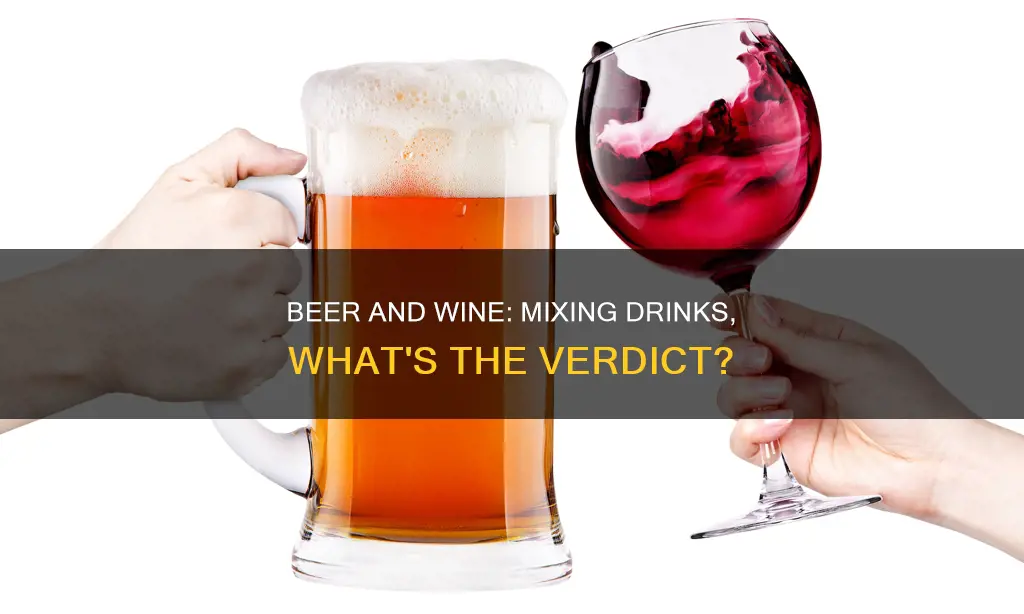
Beer before wine and you'll feel fine; wine before beer and you'll feel queer is a well-known rhyme that many people have tried—and failed—to live by. But is there any truth to it? Under carefully controlled lab conditions, researchers from the University of Cambridge in the UK and Witten/Herdecke University in Germany set out to find an answer. Their study, published in the American Journal of Clinical Nutrition, involved 90 volunteers aged 19 to 40 who were split into three groups and given various combinations of beer and wine. The results? It doesn't matter whether you have beer or wine first—if you drink too much, you're likely to have a hangover.
| Characteristics | Values |
|---|---|
| Effect of drinking beer after wine | No scientific evidence to support that drinking beer after wine worsens hangovers. |
| Folk sayings | "Beer before wine and you'll feel fine; wine before beer and you'll feel queer." |
| Folk sayings | "Beer before liquor, never been sicker; liquor before beer, in the clear." |
| Folk sayings | "Grape or grain, but never the twain." |
| Folk sayings | "Wein auf Bier, das rat’ ich Dir—Bier auf Wein, das lass’ sein" (German) |
| Folk sayings | "Bière sur vin est venin, vin sur bière est belle manière" (French) |
| Scientific studies | A 2019 study at Cambridge University found no difference in hangover severity between drinking beer then wine or wine then beer. |
| Scientific studies | A study at Witten/Herdecke University in Germany found no difference in hangover severity between drinking orders. |
| Scientific studies | Women tend to have worse hangovers than men. |
| Scientific studies | Vomiting and perceived drunkenness are associated with heavier hangovers. |
What You'll Learn
- Beer before wine, or wine before beer—you'll be hungover either way
- The total amount of alcohol you drink matters more than the order
- Women tend to have worse hangovers than men
- Vomiting and perceived drunkenness are associated with heavier hangovers
- Hangovers are likely influenced by ingredients other than pure alcohol content

Beer before wine, or wine before beer—you'll be hungover either way
The old saying goes, "beer before wine and you'll feel fine; wine before beer and you'll feel queer". But is there any truth to this? Well, researchers at Witten/Herdecke University in Germany and the University of Cambridge in the UK decided to find out once and for all.
In their study, 90 participants aged 19 to 40 were split into three groups. The first group drank about two and a half pints of lager followed by four large glasses of white wine. The second group had the same drinks but in reverse order. The third group had only beer or wine up to the same breath alcohol concentration. Everyone drank up to 0.11%, so they had the same alcohol level in their systems.
The participants were asked to rank their level of drunkenness on a scale of 1 to 10 throughout the experiment. They were also given a glass of chilled water before bed, with the size depending on their body weight, and they spent the night under medical supervision.
The next morning, the groggy-headed participants were asked about their hangovers and scored on the Acute Hangover Scale, which ranks factors such as thirst, fatigue, headache, dizziness, nausea, stomach ache, a fast heart rate and loss of appetite. A week later, the volunteers repeated the experiment in reverse.
The results showed that the order of drinks had no impact on hangover intensity. So, whether you drink beer before wine or wine before beer, you're going to be just as hungover either way!
According to Dr Tarek Hassanein, a specialist at the Southern California Liver Centers, "The order in which you drink alcohol does not matter because it all reflects on how many grams of alcohol the person is drinking. Over 30 grams for men and over 20 grams for women a day is deleterious to the liver, irrespective of the type of alcohol."
So, while the specific order of drinks may not matter when it comes to hangovers, it's important to remember that drinking in moderation is always the best approach. As the saying goes, "everything in moderation, including moderation!"
Texas Teen Beer Laws: What's Allowed?
You may want to see also

The total amount of alcohol you drink matters more than the order
The idea that drinking beer after wine is a bad idea is a well-known rhyme. The saying goes, "beer before wine and you'll feel fine; wine before beer and you'll feel queer." However, scientific studies have debunked this myth. Research has shown that the total amount of alcohol consumed has a much bigger impact on how you feel than the specific order of drinks.
In a study conducted by researchers at Witten/Herdecke University in Germany and the University of Cambridge in the UK, 90 participants aged 19 to 40 were recruited and split into three groups. The first group consumed 2.5 pints of cold lager beer followed by four large glasses of chilled white wine. The second group consumed the same amount of alcohol but in reverse order. The control group drank only wine or beer. Throughout the experiment, participants were asked to rate their well-being and level of drunkenness. The next morning, they were asked to score their hangover intensity.
The results showed that the order of drinks had no significant impact on hangover scores. Participants reported similar hangover symptoms regardless of the order in which they consumed alcohol. This finding was consistent with another study conducted at Cambridge University, which found that volunteers who drank beer followed by wine reported the same level of hangover severity as those who drank wine first and then beer.
While the order of drinks may not matter, the total amount of alcohol consumed does. Dr. Tarek Hassanein, a specialist at the Southern California Liver Centers, stated that "over 30 grams of alcohol for men and over 20 grams for women per day is deleterious to the liver, irrespective of the type of alcohol." Therefore, it is important to monitor your total alcohol intake to avoid negative health consequences.
Additionally, it is worth noting that individual factors such as age, sex, body weight, and drinking habits did not appear to predict hangover intensity. However, vomiting and perceived drunkenness were associated with more severe hangovers. The study also highlighted the importance of hangovers as a warning sign to drink in moderation and make informed decisions about alcohol consumption.
Puppies and Beer: A Dangerous Mix?
You may want to see also

Women tend to have worse hangovers than men
Women tend to experience worse hangovers than men, according to several studies. Researchers at the University of Missouri-Columbia found that women get worse hangovers than men even when drinking less alcohol. This is because women tend to weigh less and have lower percentages of total body water than men, so they achieve higher degrees of intoxication per unit of alcohol.
Nutritionist Amanda Ursell agrees that women experience worse hangovers than men due to their higher percentage of body fat and lower amount of body water. Men also have alcohol dehydrogenases in their stomachs, which are enzymes that help metabolize alcohol, whereas women do not. This means that men can begin processing alcohol more quickly.
However, other studies have found no difference between men and women in terms of hangover severity when accounting for factors such as height, weight, and amount of alcohol consumed. Ultimately, the severity of a hangover depends on various factors, including height, weight, and the amount of alcohol consumed.
Non-Alcoholic Beer: A Safe Choice or a Relapse Risk?
You may want to see also

Vomiting and perceived drunkenness are associated with heavier hangovers
Vomiting and perceived drunkenness are indeed associated with heavier hangovers. In a study, about 10% of the participants threw up, and the results showed that the order of drinks did not impact the intensity of the hangover. However, the amount of alcohol consumed and how fast the alcohol is absorbed are the main factors contributing to a hangover. The more alcohol consumed, the more prevalent the hangover.
Hangovers are characterised by a range of unpleasant physical and mental symptoms, including fatigue, headache, nausea, vomiting, dizziness, increased blood pressure, muscle aches, and thirst, among others. These symptoms can vary in intensity and duration, typically lasting up to 24 hours.
The causes of a hangover are multifactorial, including the direct physiological effects of alcohol, such as dehydration, electrolyte imbalances, gastrointestinal disturbances, low blood sugar, and disruption of sleep and biological rhythms. Additionally, the effects of alcohol withdrawal, the presence of alcohol metabolites, and other factors like congeners (compounds in beverages that contribute to taste, smell, and appearance) can also contribute to the severity of a hangover.
While there is no quick cure for hangovers, staying hydrated, eating bland foods, getting adequate sleep, and taking certain medications to alleviate specific symptoms can help manage the discomfort.
Liquor to Beer: A Healthy Transition or Dangerous Myth?
You may want to see also

Hangovers are likely influenced by ingredients other than pure alcohol content
While the old adage "beer before wine, you'll feel fine; wine before beer, you're in for a queer" may be well-known, it is not necessarily true. In fact, research has shown that the order in which you drink beer and wine does not affect the severity of your hangover. The real predictor of hangover intensity is the total amount of alcohol consumed.
However, it is important to note that the ingredients in alcoholic drinks may also influence hangovers. Congeners, compounds produced during the fermentation process, are thought to contribute to hangovers. Drinks with higher congener levels include darker alcohols such as tequila, cognac, whiskey, and red wine. These drinks tend to give more intense hangovers than clearer spirits like vodka, gin, or white wine, which have lower congener levels.
Congeners are responsible for the taste and aroma of alcoholic drinks. For example, acetaldehyde gives rums and bourbons a fruity smell, while isobutylene alcohol has a sweet smell. However, some congeners, like methanol, can worsen hangovers. Methanol breaks down into formic acid and formaldehyde, which can make a hangover more severe. Drinks with higher methanol content, such as brandy and rum, tend to be associated with more intense hangovers.
In addition to congeners, other substances in alcoholic drinks can contribute to hangover symptoms. For example, sulfites, which are added to wine as preservatives, can cause headaches in people sensitive to them.
So, while the order of drinking beer and wine may not matter, the types of drinks and their ingredients can indeed influence the severity of hangovers. To minimize hangover symptoms, it is advisable to limit the consumption of dark alcohols with high congener levels and opt for clearer, lighter-coloured drinks instead.
Beer and Breastfeeding: What's Safe?
You may want to see also
Frequently asked questions
A study by Cambridge University found that the order of drinks did not affect the intensity of the hangover. So, it's not true that drinking beer after wine will make you feel sicker than drinking them in the opposite order.
The saying probably arose because you tend to get drunk faster on wine, so if you start with wine, you may end up drinking more overall.
Yes, according to some research, drinks with more congeners (natural compounds that give off distinctive flavours and colours) are more likely to cause severe hangovers.
Congeners are natural compounds in liquor that give off distinctive flavours and colour characteristics.
Pace yourself—one drink per hour gives your body time to process the alcohol so you don't become overly tipsy. Sip water in between drinks.







